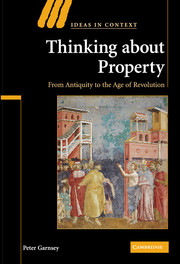Book contents
- Frontmatter
- Contents
- Abbreviations
- Preface
- Introduction
- Chapter 1 Plato's ‘communism’, Aristotle's critique and Proclus' response
- Chapter 2 Plato's ‘communism’: from late antiquity via Islamic Spain to the Renaissance
- Chapter 3 Renunciation and communality: thinking through the primitive Church
- Chapter 4 The poverty of Christ: crises of asceticism from the Pelagians to the Franciscans
- Chapter 5 The state of nature and the origin of private property: Hesiod to William of Ockham
- Chapter 6 The state of nature and the origin of private property: Grotius to Hegel
- Chapter 7 Property as a legal right
- Chapter 8 Property as a human right
- Conclusion
- Bibliography
- Index
Chapter 5 - The state of nature and the origin of private property: Hesiod to William of Ockham
Published online by Cambridge University Press: 22 September 2009
- Frontmatter
- Contents
- Abbreviations
- Preface
- Introduction
- Chapter 1 Plato's ‘communism’, Aristotle's critique and Proclus' response
- Chapter 2 Plato's ‘communism’: from late antiquity via Islamic Spain to the Renaissance
- Chapter 3 Renunciation and communality: thinking through the primitive Church
- Chapter 4 The poverty of Christ: crises of asceticism from the Pelagians to the Franciscans
- Chapter 5 The state of nature and the origin of private property: Hesiod to William of Ockham
- Chapter 6 The state of nature and the origin of private property: Grotius to Hegel
- Chapter 7 Property as a legal right
- Chapter 8 Property as a human right
- Conclusion
- Bibliography
- Index
Summary
INTRODUCTION: PIERRE-JOSEPH PROUDHON AND THEODOR MOMMSEN
In 1849 a cartoon appeared in Germany depicting The Progress of Learning (‘der Fortschritt der Wissenschaft’) over 300 years. Three panels present scholarly figures in dress appropriate to the academic profession of their epochs, the sixteenth, eighteenth and nineteenth centuries. Each panel bears a caption, apparently drawn from Roman law.
On the left: ‘Justice is the constant and unwavering determination to give to each his right.’ This is a citation, attributed to the classical jurist Ulpian (d. 223), from the sixth-century Digest of Justinian.
In the centre: ‘The king is completely exempt from all law.’ This is an Absolutist State's version of a statement of the same jurist, Ulpian: the emperor is exempt from the laws.
On the right: ‘Property is theft’ (Dominium est furtum). No Roman jurist, we may be sure, ever made this pronouncement. The slight figure in this panel is full of nervous energy as he points emphatically at his audience. He is Theodor Mommsen, Extraordinary Professor of Roman Law at Leipzig. At the time only thirty-one years of age, he was later to become arguably the greatest historian of ancient Rome of all time. In 1840 Pierre-Joseph Proudhon of Besançon had posed the question: ‘Qu'est-ce que la propriété?’ and had given as his answer: ‘La Propriété, c'est le vol.’ Nine years later we find Mommsen being credited with a Latinized version.
- Type
- Chapter
- Information
- Thinking about PropertyFrom Antiquity to the Age of Revolution, pp. 107 - 135Publisher: Cambridge University PressPrint publication year: 2007



